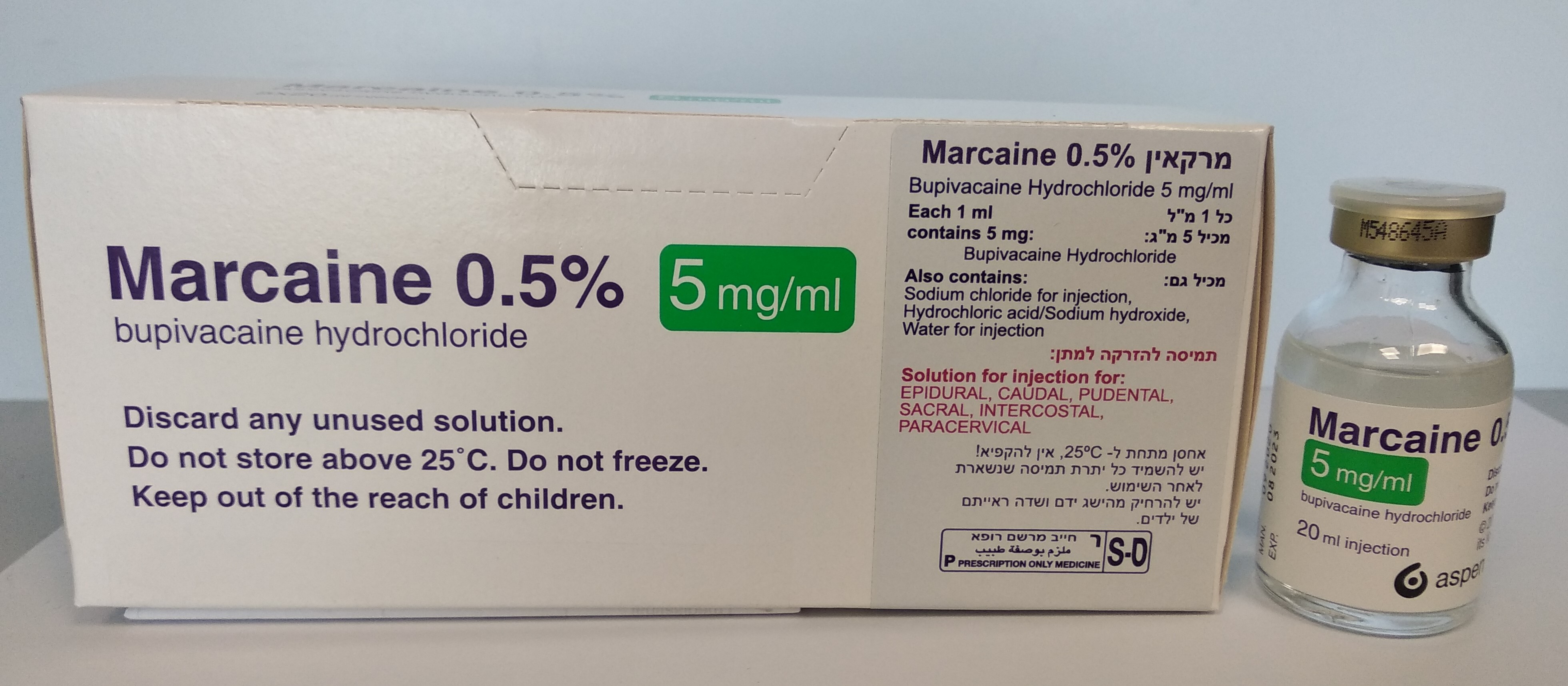Quest for the right Drug

מרקאין % 0.5 MARCAINE 0.5 % (BUPIVACAINE HYDROCHLORIDE)
תרופה במרשם
תרופה בסל
נרקוטיקה
ציטוטוקסיקה
צורת מתן:
אפידורל, לתוך הזנבעצם הזנב, לתוך עצב, לאגן, לעצבי הצלעות, זריקה באזור צוואר הרחם : EPIDURAL, CAUDAL, PUDENTAL, SACRAL, INTERCOSTAL, PARACERVICAL
צורת מינון:
תמיסה להזרקה : SOLUTION FOR INJECTION
עלון לרופא
מינוניםPosology התוויות
Indications תופעות לוואי
Adverse reactions התוויות נגד
Contraindications אינטראקציות
Interactions מינון יתר
Overdose הריון/הנקה
Pregnancy & Lactation אוכלוסיות מיוחדות
Special populations תכונות פרמקולוגיות
Pharmacological properties מידע רוקחי
Pharmaceutical particulars אזהרת שימוש
Special Warning עלון לרופא
Physicians Leaflet
Pharmacological properties : תכונות פרמקולוגיות
Pharmacodynamic Properties
5.1 Pharmacodynamic properties Pharmacotherapeutic group: Local anaesthetics ATC code: N01BB01 Marcaine contains bupivacaine, which is a long-acting amide-type local anaesthetic. Bupivacaine reversibly blocks impulse transmission in nerve fibres by inhibiting the transport of sodium ions over the nerve cell membrane. Similar effects can also be seen on excitatory membranes in the brain and cardiac muscle. The most prominent characteristic of bupivacaine is the long duration of action; the difference in duration of action between bupivacaine with and without adrenaline is relatively small. Bupivacaine is well suited to continuous epidural blockade. Lower concentrations have a lesser effect on motor nerve fibres and a shorter duration of action, and can be suitable for prolonged analgesia, such as in childbirth or postoperatively.
Pharmacokinetic Properties
5.2 Pharmacokinetic properties The absorption rate is dependent on the dose, route of administration and vascularisation of the injection site. Intercostal blocks lead to the highest plasma concentrations (4 mg/l following a dose of 400 mg) due to rapid absorption; subcutaneous abdominal injections lead to the lowest plasma concentrations. Rapid absorption and a high plasma concentration are seen in children following caudal block (approx. 1-1.5 mg/l following a dose of 3 mg/kg). Bupivacaine has complete and biphasic absorption from the epidural space, with half lives of approx. 7 minutes and 6 hours, respectively. The slow absorption is rate-limited by the elimination of bupivacaine, which explains why the elimination half life following epidural administration is longer than that following intravenous administration. The distribution volume of bupivacaine at steady state is 73 litres; the hepatic extraction ratio is 0.40; total plasma clearance is 0.58 l/min; the elimination half life is 2.7 hours. The elimination half life in newborns is up to 8 hours longer than in an adult. The half life in children aged over 3 months is equivalent to that in adults. The pharmacokinetics in children is similar to that in adults. Plasma protein binding is 96% and primarily involves alpha-1-acid glycoprotein. There may be an elevated level of this protein following major surgery, giving a higher total plasma concentration of bupivacaine. The unbound concentration of bupivacaine will however remain unchanged. This explains why plasma concentrations that exceed the toxic level can be well tolerated. Bupivacaine is almost entirely metabolised in the liver, primarily through aromatic hydroxylation to 4-hydroxy-bupivacaine and N-dealkylation to pipecoloxylidide, both of which are mediated by cytochrome P450 3A4. Clearance is therefore dependent on the hepatic blood flow and the activity of the metabolising enzyme. Bupivacaine crosses the placenta and the concentration of unbound bupivacaine in the mother and foetus is equalised. However, the total plasma concentration will be lower in the foetus due to a lower degree of protein binding.

שימוש לפי פנקס קופ''ח כללית 1994
לא צוין
תאריך הכללה מקורי בסל
01/01/1995
הגבלות
תרופה שאושרה לשימוש כללי בקופ'ח
מידע נוסף
